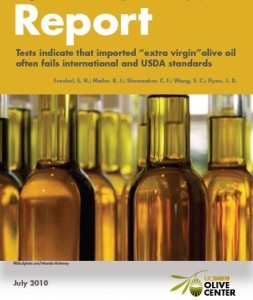
Extra virgin olive oil is the top grade and priciest of olive oils. To meet international standards, extra virgin must be removed from the olive without using heat or solvents. It also has to meet specific criteria for chemical makeup, flavor and aroma.
However in the new study, researchers at UC Davis and in Australia discovered that 69 percent of the imported oils sampled, compared to just 10 percent of the California-produced oils sampled, failed to meet internationally accepted standards for extra virgin olive oil.
The imported oils tested were purchased from supermarkets and “big box” stores in three California regions: Sacramento, the San Francisco Bay Area and Los Angeles County. The California brands, however, were found only in the Sacramento and San Francisco Bay Area.
Defects in those oils that failed to pass muster included oxidation from excessive temperature, light or aging and addition of cheaper refined olive oils. Other flaws may have been linked to improper processing or storage and use of damaged or overripe olives.
The complete report from the study, which is the first of its kind from an American college or university, is available online from the UC Davis Olive Center at: http://olivecenter.ucdavis.edu/.
The study was funded by Corto Olive, California Olive Ranch and the California Olive Oil Council.
Anecdotal reports of low-quality olive oils lurking behind extra-virgin labels have been floating about for some time but this is the first “empirical proof” to support those suspicions, according to Dan Flynn, executive director of the UC Davis Olive Center..
“The intent of the study was to provide consumers and retailers with an accurate picture of the quality of olive oils now being marketed through grocery stores and other retail outlets in California,” said Flynn, noting that the United States is the third-largest consumer of olive oil in the world.
“Our hope is that these findings will lead to improved methods for evaluating extra virgin olive oil, and increased consumer confidence that “extra virgin” on the label means extra virgin in the bottle,” he said.